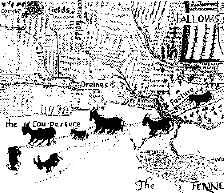The Midlands Uprising
The Midlands Uprising of 1607 was, like earlier rebellions, caused by enclosures, and pressure upon marginal smallholders to pay higher rents. Landlords wanted to force them out and fence their fields, allowing more efficient estate management, increased production, and greater profits from the expanding market.
The nature of the protest and the government reaction to it show two characteristic phenomena of the times: the popular acceptance of the social and political hierarchy, and the paternal* approach of the government.
Acceptance of hierarchical order
The general pattern of such riots and revolts shows that people with grievances first sought amends through their local magistrates, complaining of their landlord's "anti-social" behaviour. Only after these attempts were frustrated did the poor act on their own, and even then they did not challenge the established order but sought its proper maintenance.
Popular acceptance of the social order shows the strength with which the doctrine of deference and obedience was instilled in Tudor and Stuart society. Through the Church, the government taught that bad harvests were a divine punishment for sins. Blame was directed at "middlemen," such as capitalist entrepreneurs, whose large-scale production was not for local consumption but for marketing in cities and abroad (or was hoarded to bring profits from inflation). Disturbances were most common in areas where there was a productive grain trade rather than where the suffering was greatest.
Click here to read about the uprising and one of Shakespeare's plays*.
Footnotes
-
Paternalism
Authorities tried to alleviate stresses upon the poor largely out of fear of their growing numbers. Proclamations were made in the 1590s against exploitation by landlords; following the Midland Revolt, the Council issued pardons to rioters and fined some of the offending landowners in Star Chamber. As in other times of economic crisis, Justices of the Peace swung into action, enforcing corrective measures. They controlled grain prices, distributed grain to needy areas, halted exports, pressured hoarding farmers to market their stockpiles, conserved grain supplies by restrictions on brewers and alehouses, and ensured that poor relief was fully administered.
Government sympathy for the poor did not, however, extend to vagrants, as seen in the following order to the mayor and aldermen of London during a time of plague:
"That all masterless men who live idly in the city without lawful calling, frequenting places of common assemblies, as interludes, gaming-houses, cockpits, bowling alleys and such other places, may be banished the city."
-
Coriolanus
The uprising of 1607, and the fear it spread among the landed gentry may have influenced Shakespeare in his portrayal of the common people in Coriolanus, where they are represented as hungering for grain, unruly and unreasonable.
(Click for a passage from the play.)
